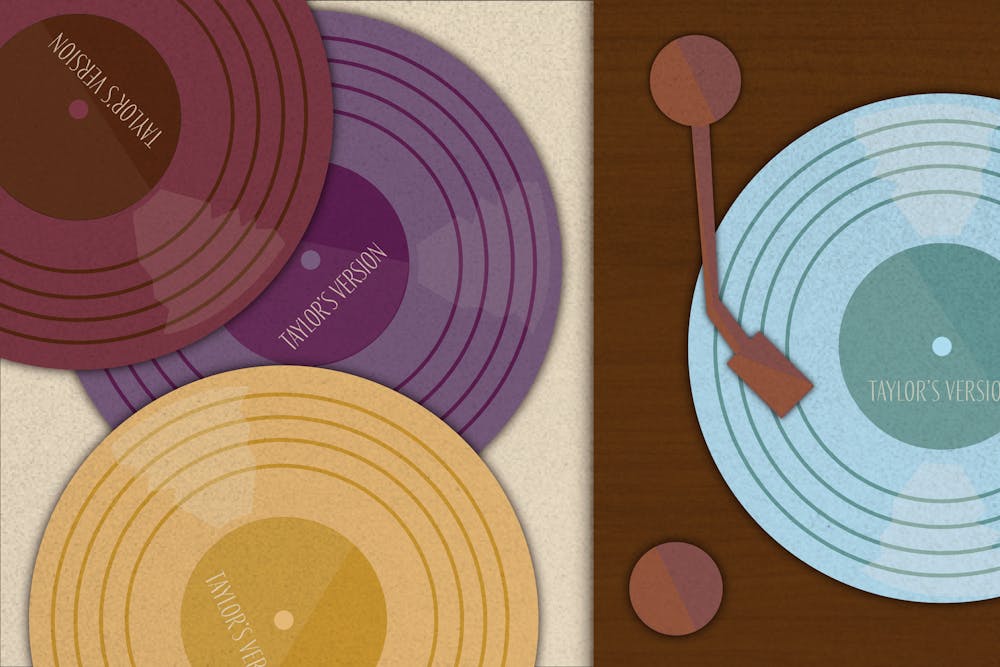With "1989 (Taylor’s Version)" being newly released, non-Taylor Swift fans may still be asking, “Isn’t it the same songs?” or “Why is she re-recording her old music?”
But it is more than just recreating the same music.
Imagine creating something to be proud of, only to have someone else dictate what can and can't be done with it while also profiting off of it.
That was the reality for Taylor Swift in 2019 when music manager Scooter Braun bought her former record label, Big Machine Records. If anyone wanted to stream her songs or use them in advertising, they would pay Braun instead of Swift.
Swift’s decision in re-recording has highlighted an ongoing issue in the music industry.
Before Swift, Prince and Paul McCartney have also been strong advocates for claiming their masters.
By owning their masters, the artist gets full creative control of what they get to do with their music without having to ask for permission from the record label. It is important because artists get to fully express themselves and maintain artistic integrity.
“I may not be a musician, but as a visual artist, it’s very important to me when people actually try and fight to own their work,” saidPaisley Williams, a first-year art education student.

While Swift owns the rights to the song compositions and lyrics, she doesn’t own the legal rights to the original recordings. When Swift signed her contract in 2006, it was typical for record labels to own artist's masters since musicians needed to rely on their distribution before streaming services existed.
The situation was the "worst case scenario," Swift said in a 2019 Tumblr post.
For years, Swift said that she has been mistreated by Braun, especially during the Kanye West-Swift feud. In the same post, she said that every time his name was mentioned, she was either crying or trying not to. Once he bought her masters, he declined the use of using her older songs for a documentary Swift was making.
Swift has since switched to Republic Records, where the label allows her to own her music. She then began working on new music and re-recordings.
Not only has she been successful, but it is inspiring to others as it gives a message to confront and overcome challenges in one’s own professional journey.
“She's taking control of her narrative and just speaking out," said Madeline Hansen, a second-year aerospace engineering student. "I kind of relate to that myself in engineering.”
Swift released her first re-recording, "Fearless (Taylor’s Version)," in April 2021, followed by "Red (Taylor’s Version)" debuting in November 2021.
Later this year, she released "Speak Now (Taylor’s Version)" and "1989 (Taylor’s Version)." There are just two re-recordings left, "Reputation" and her self-titled album, which will be announced at a later date.
Re-recording the albums was one of the best decisions Swift has made in terms of changing the way the music industry works and bringing together fans. It has allowed her fan base to support each re-recorded album as they rekindle the love and connection to her younger tracks.
“When I started listening to her, I was about 10 or 12," Hansen said. "We get to experience them as if they're being released for the first time. And so we get to relive all of the experiences as she's going through them. It's just an amazing experience, honestly.”
Artists having creative autonomy feels meaningful and authentic. By raising awareness on artistic ownership, traditional contracts may be changed in the future for young, aspiring musicians. Swift's advocacy gives her fans a hopeful message that they can still preserve their artistic vision and not give in to unfair treatment.
While fans get to enjoy her iconic tracks again, they are also celebrating her owning the rights to her music. Swift’s decision makes it vocal to artists that they have the right to own their work. And it is a message that is worth celebrating.

